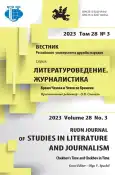Креативные индустрии: визуализация коммуникаций и эстетизация медиаформ
- Авторы: Уразова С.Л.1,2
-
Учреждения:
- Всероссийский государственный университет кинематографии имени С.А. Герасимова
- Академия медиаиндустрии
- Выпуск: Том 28, № 3 (2023): Время Чехова и Чехов во Времени
- Страницы: 585-594
- Раздел: Журналистика
- URL: https://journal-vniispk.ru/2312-9220/article/view/319072
- DOI: https://doi.org/10.22363/2312-9220-2023-28-3-585-594
- EDN: https://elibrary.ru/LRRPLE
- ID: 319072
Цитировать
Полный текст
Аннотация
Совершенствование инновационных технологий оказывает непосредственное воздействие на социальное пространство и медиарынок, заставляя производителей медиапродукта обновлять и приумножать свои компетенции, навыки в русле требований цифрового времени. Это обусловлено как появлением новых профессий в производстве медиаконтента, так и связано с признанием растущего творческо-экономического потенциала креативных индустрий. Цель исследования - показать связь медиаиндустрии с креативными индустриями в контексте их гуманитарного вклада в развитие цифрового будущего. Использован метод выборочного прочтения и комментирования источников из разных наук - философии, психологии, культурологии, семиотики, искусствоведения, медиакоммуникативистики. Обнаружено, что внедрение IT-технологий в производство медиапродукта, адаптация медиа в цифровой экономике заставляют пересматривать подходы к изучению гуманитарных наук и вырабатывать теорию медиа с учетом применения междисциплинарных знаний. Сделан вывод о важности визуализации через актуализацию воображения. В информационной среде в настоящее время превалирует потребность в визуализации коммуникаций и эстетизации современных медиаформ, связанных с культурно-историческим горизонтом цифровой эпохи. Данные аспекты также изучены, подчеркнуты значимость роли креативных индустрий в цифровом будущем, их экономическая и гуманитарная составляющие, позволяющие социуму проникнуться аксиологической парадигмой новой реальности.
Ключевые слова
Об авторах
Светлана Леонидовна Уразова
Всероссийский государственный университет кинематографии имени С.А. Герасимова; Академия медиаиндустрии
Автор, ответственный за переписку.
Email: svetlana.urazova@gmail.com
ORCID iD: 0000-0003-2264-2859
доктор филологических наук, доцент, главный редактор научного журнала «Вестник ВГИК», профессор кафедры киноведения, Всероссийский государственный университет кинематографии имени С.А. Герасимова; заведующая научно-исследовательским сектором, профессор кафедры журналистики, Академия медиаиндустрии
Российская Федерация, 129226, Москва, ул. Вильгельма Пика, д. 3; Российская Федерация, 127521, Москва, ул. Октябрьская, д. 105, корп. 2Список литературы
- Bakhtin, M.M. (1975). The problem of content, material and form in verbal art. Questions of literature and aesthetics. Researches of different years. Moscow: Khudozhestvennaya Literatura Publ. (In Russ.)
- Baumann, K. (2018). Infrastructures of the imagination: Building new worlds in media, art, & design (Doctoral dissertation). University of Southern California.
- Berezhnaya, M. (Ed.). (2018). Aesthetics of journalism. St. Petersburg: Aleteia Publ. (In Russ.)
- Chen, C. (2005). Top 10 unsolved information visualization problems. IEEE Computer Graphics and Applications, 25(4), 12-16. https://doi.org/10.1109/MCG.2005.91
- Dekavalla, M. (2020). Visualizing the game frame: Constructing political competition through television images in referendum coverage. Visual Communication, 19(4), 483-505. https://doi.org/10.1177/1470357218801395
- Fedotova, N. (Ed.). (2016). Visual communication in sociocultural dynamics: Collection of articles. Kazan: Kazan Federal University. (In Russ.)
- Fromm, E. (2023). The heart of man: Its genius for good and evil. Open Road Media.
- Gerasimova, I.A. (2008). Visualization, creativity and cultural practices. In I.A. Gerasimova (Ed.), Visual Image (Interdisciplinary Research) (pp. 10-26). Moscow: Institute of Philosophy, Russian Academy of Sciences. (In Russ.)
- Jensen, R. (1999). The dream society: How the coming shift from information to imagination will transform your business. New York: McGraw Hill Professional Publisher.
- Lazutova, N.M., & Volkova, I.I. (2017). Screen mass media and human ecology: From enchantment to joining. Vestnik of the Orenburg State University, 212(12), 106-111. (In Russ.)
- Lotman, Yu.M. (1992). Selected articles (vol. 1). Tallinn: Alexandra Publ. (In Russ.)
- Maier, J., Glogger, I., Otto, L.P., & Bast, J. (2023). Is there a visual bias in televised debates? Evidence from Germany, 2002-2017. Visual Communication, 22(2), 221-242. https://doi.org/10.1177/147035722097406
- Mankovskaya, N. (2018). Postmodernism in aesthetics. Philosophical anthropology, 4(1), 192-230. (In Russ.) https://doi.org/10.21146/2414-3715-2018-4-1-192-230
- Manovich, L. (2013). Media visualization: Visual techniques for exploring large media collections. In K. Gates (Ed.), Media Studies Futures. The International Encyclopedia of Media Studies (vol. VI). Oxford: Blackwell.
- Matsko, V.A. (2021). Interdisciplinary research in the study of creative industries. Bulletin of Saint Petersburg State University of Culture, 49(4), 80-85. (In Russ.)
- Shevchenko, V.E. (2014). Visual content as a trend in modern journalism. Mediascope, (4). (In Russ.) Available from: http://www.mediascope.ru/1654 (accessed: 12.03.2023).
- Urazova, S.L. (2008). Reality shows in the context of contemporary television (abstract of PhD. Philol. Sci. Dis.). Moscow. (In Russ.)
- Urazova, S.L. (2015). Screen communications as a form of socialization and individualization. VGIK Bulletin, 24(2), 142-149. (In Russ.)
- Urazova, S.L. (Ed.). (2021). Ecosystem of media: Digital modifications. Chelyabinsk: SUSU Publ. (In Russ.)
- Zarifian, M., Volkova, I., & Lazutova, N. (2022). The evolution of cartoons throughout the history of mass communication. International Journal of Media and Information Literacy, 7(2), 629-638. https://doi.org/10.13187/ijmil.2022.2.629
Дополнительные файлы









